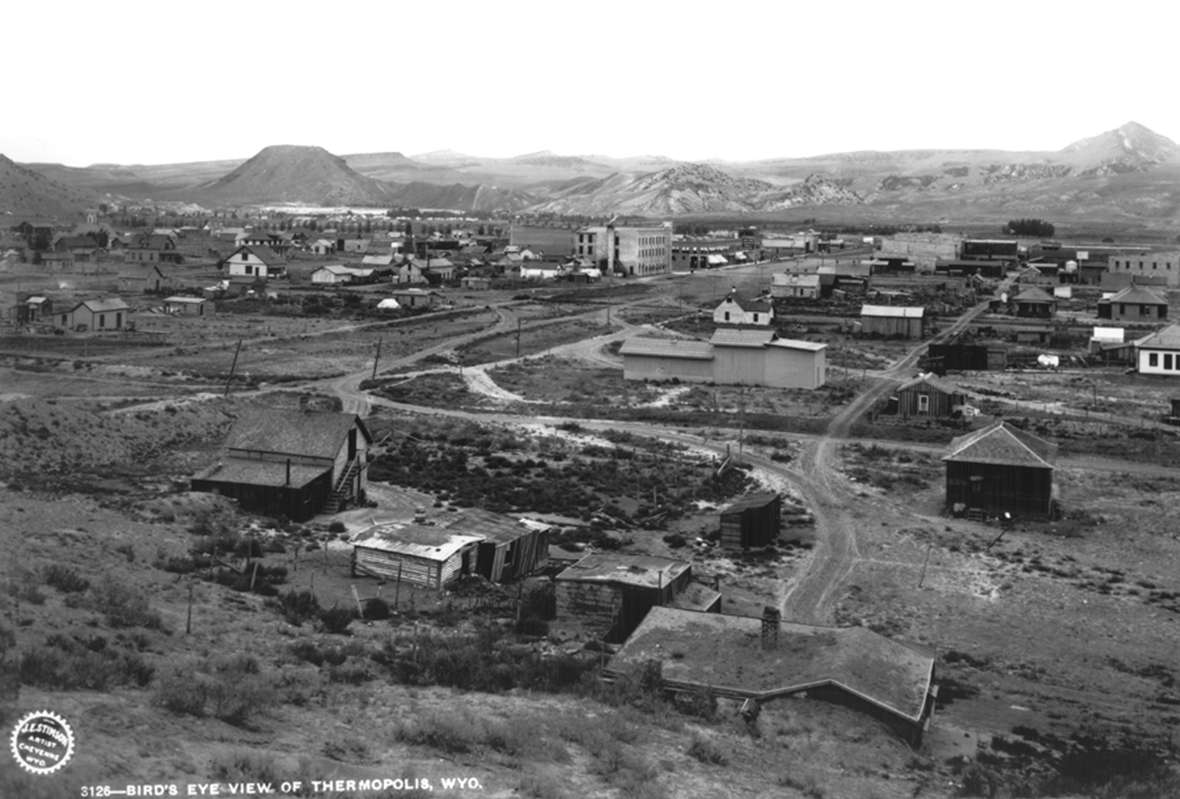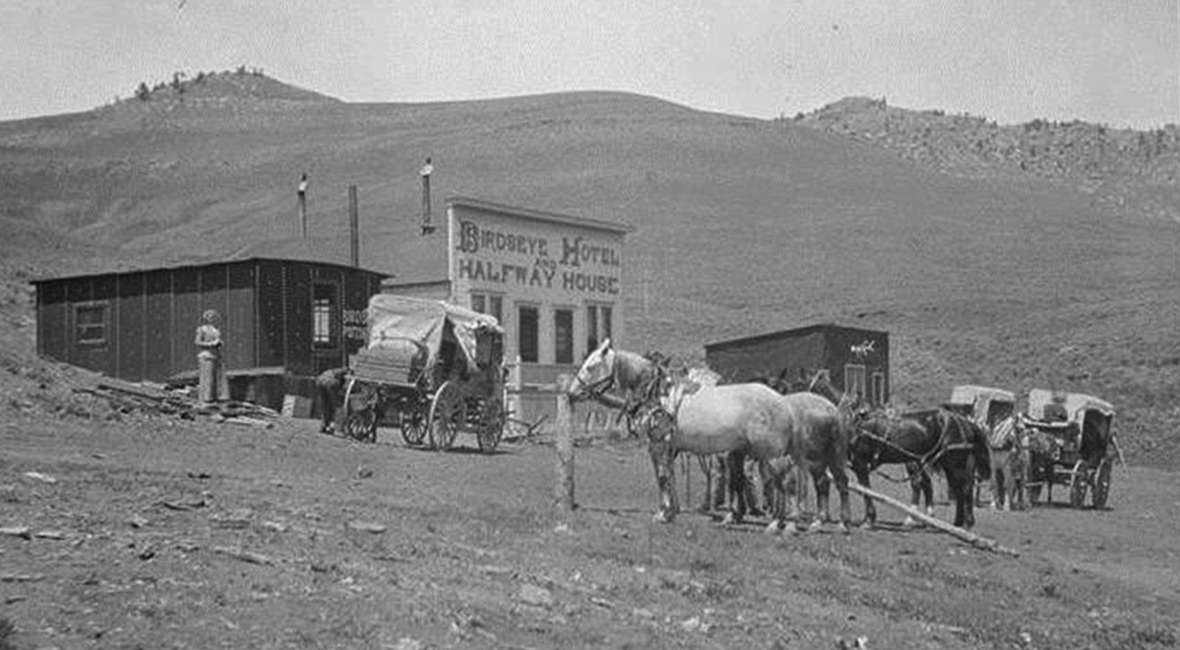- Home
- Oral Histories
- Caroline Fuller, Pioneer Dentist
Caroline Fuller, Pioneer Dentist
Caroline Fuller had never heard of women’s liberation in 1905 when she entered a field of medicine usually reserved for men—dentistry. How she came to pull teeth and take dental impressions while raising three children and teaching school in a remote part of Wyoming at the turn of the last century is only one phase of her interesting life story.
Caroline Fuller—Mrs. George Fuller—was about 93 years old when interviewed June 14, 1973, at the Wyoming Pioneer Home in Thermopolis, Wyo., by May Gillies on behalf of the Hot Springs County Historical Society.
This oral history is from the collections of the Wyoming State Archives. Used with thanks.


May Gillies: Caroline, you have had a very interesting life and I’d like you to tell me about it. But first I’d like you to tell me where you were born and when.
Caroline Fuller: In Czechoslovakia in 1880.
May Gillies: And you came to this country …
Caroline Fuller: To Omaha, Nebraska.
May Gillies: When was that?
Caroline Fuller: In ’83.
May Gillies: What was your father’s name?
Caroline Fuller: Joseph Fibiger, F-i-b-i-g-e-r.
May Gillies: And your mother’s name?
Caroline Fuller: He was a watchmaker in [unintelligible]. Mother’s name was Caroline.
May Gillies: What was her maiden name?
Caroline Fuller: Von Brill, V-o-n and then B-r-i-l-l.
May Gillies: And when did you go to school in Omaha?
Caroline Fuller: I went all the way through high school and grade school and business college.
May Gillies: And then you worked there?
Caroline Fuller: I worked for Dr. Bailey, the dentist, for five or six years.
May Gillies: And you learned dentistry?
Caroline Fuller: I learned enough dentistry so to be able to fill teeth and pull teeth and send away and have plates made.
May Gillies: Not very many women did that did they?
Caroline Fuller: No, not in those years, no.
May Gillies: In fact, not very many do it now I don’t suppose.
Caroline Fuller: There’s more of them now.
May Gillies: How did you come out to Wyoming?
Caroline Fuller: I came to visit—I came out in 1904—came out to visit the Longfellow family at their ranch.
May Gillies: And did you like it well enough to come back?
Caroline Fuller: I liked it well enough, I met and got married, of course, my future husband there and came back the following year.
May Gillies: How did you meet your husband?
Caroline Fuller: At a dance.
May Gillies: And I understand you did some dentist work, dentistry then on your visit.
Caroline Fuller: Yes, I did a lot of dentistry.
May Gillies: Can you tell me about helping Mr. Okie? [J.B. Okie, the so-called sheep king of central Wyoming, based in Lost Cabin, Wyo.—Eds.]
Caroline Fuller: Yes, that was an emergency case. He had a terrible toothache and he couldn’t get to Casper to the nearest dentist because the stage didn’t come on until Monday so we, he came down and got me at the, after the dance at the hotel, and he got me and we didn’t have any instruments of any kind, so we got a pair of, what do you call them?
May Gillies: A brace and a bit?
Caroline Fuller: Yeah, brace and bit things in the store and different boys around there held him down and I used the instrument and opened up his tooth and relieved the pressure and he was able to go on to Casper Monday to have his tooth filled.
May Gillies: And how did he travel to Casper?
Caroline Fuller: On the bus.
May Gillies: How did he manage to stand it without anesthetic?
Caroline Fuller: Well he took, he had several drinks and he was pretty well under the effects of the drinks.
May Gillies: But still it was quite a job to hold him down.
Caroline Fuller: Oh yes, they had to hold him down.
May Gillies: So, then, that’s where you met Mr. Fuller?
Caroline Fuller: Yes.
May Gillies: And the following year you were married?
Caroline Fuller: Yes.
May Gillies: Can you tell me about that?
Caroline Fuller: I was married in Casper.
May Gillies: And two other couples were married about the same time.
Caroline Fuller: Yeah, they were married at Lost Cabin and we had a preacher coming through and they were married. But I was married in Casper and that night we came down and then we all celebrated together.
May Gillies: Who were these other two couples?
Caroline Fuller: Dr. Jewel and his wife, Willoughby, and her sister.
May Gillies: Well, you must have had a good time, all of you.
Caroline Fuller: Young folk. Danced all night.
May Gillies: Those dances were really something. Well then, you and your husband were in the ranching business.
Caroline Fuller: Yes.
May Gillies: And you had, your family was born there.
Caroline Fuller: Born at Lost Cabin.
May Gillies: Can you tell me their names?
Caroline Fuller: Yes. It was Caroline Louise was the first one born and she passed away when she was 12 years old. Poisoned candy during the war. Then I had, Inez was born and then my son, George.
May Gillies: And you had trouble getting a teacher to teach your children, I understand.
Caroline Fuller: Yeah, we were so far out in the country and the girls coming out from the cities were afraid to walk down to the school house and back. They’d walk in the wrong direction, they’d go downhill instead of uphill coming home so finally this one girl stayed three days.
May Gillies: Oh my. What did you do then?
Caroline Fuller: Well then, I tried to get a teacher and they told me to take it over myself so I did. I took a course from the university, correspondence work, and no books to study out of. Just …
May Gillies: Did they send you questions that you had to answer and no books?
Caroline Fuller: Yes, and no books to study but I made it.
May Gillies: You probably relied on what you learned in school yourself like reading and arithmetic.
Caroline Fuller: From what I remember.
May Gillies: How many pupils did you have?
Caroline Fuller: Eight.
May Gillies: Your own three and these others.
Caroline Fuller: Yes, but there was eight altogether.
May Gillies: And how long did you teach?
Caroline Fuller: Two years.
May Gillies: Then you did get a teacher?
Caroline Fuller: Finished them and then we came to town to, for high school.
May Gillies: Oh yes, and that was, now, while you still were at Lost Cabin, you did some dentistry there for the cowboys.
Caroline Fuller: Oh I did a lot of it, yeah. They’d come over the mountain to have teeth pulled and I’d take impressions for teeth. Make new teeth for them.
May Gillies: For heaven’s sake, you mean you did it, you actually did the teeth?
Caroline Fuller: No, no, I sent to Omaha. But I’d take the impressions. Pull teeth and take impressions.
May Gillies: And you did finally get the instruments you needed, didn’t you?
Caroline Fuller: Oh yes, Dr. Bailey sent me the instruments. Little [unintelligible] engine and three pairs of pliers and we went into business.
May Gillies: Oh, I think that’s really something. Did you have a sign that said “Dr. Fuller”?
Caroline Fuller: No, I didn’t have any sign. I didn’t want any sign; I had enough trade without putting up a sign.
May Gillies: I see this article in the Riverton Ranger that headed, Aunt Caroline, Dentist of Lost Cabin. Did they all call you Auntie?
Caroline Fuller: I think Ruth Fuller put that in. That’s why she put Aunt Caroline.
May Gillies: She was your niece that wrote the article. Well, this is wonderful, this article. Well then, you came to Thermopolis and that was in 1920.
Caroline Fuller: Started Inez in high school and I was superintendent of the county hospital.
May Gillies: What were your duties then?
Caroline Fuller: Well, I would see that I had, I kept the books and saw that we had the correct number of nurses. All new work to me.
May Gillies: Then you had some more jobs.
Caroline Fuller: Yes, I had, I worked for three different county superintendents of schools.
May Gillies: And one of them was Mrs. Thompson?
Caroline Fuller: Mrs. Thompson and Mrs. Hodgson, and who was the other one?
May Gillies: Well anyway, you worked for the three of them. And you were pretty busy in a number of clubs in Thermopolis too? And then you came to live here at the Pioneer Home. And you’re still busy.
Caroline Fuller: I’m still busy.
May Gillies: You play the piano. And you’ve been here six years now. Do you think it’s a good place to live?
Caroline Fuller: Wonderful, and I’ve always thought so ever since I came in.
May Gillies: Well, I sure do thank you Caroline. This has been real interesting.
Caroline Fuller: It’s kind of rough but …
May Gillies: No, it’s just fine.
Resources
For further reading and research
- Hein, Annette. “Hot Springs County, Wyoming.” WyoHistory.org. Accessed Aug. 14, 2016 at /encyclopedia/hot-springs-county-wyoming.
- Rea, Tom. “J. B. Okie, Sheep King of Central Wyoming.” WyoHistory.org. Accessed Aug. 14, 2016 at /essays/j-b-okie-sheep-king-central-wyoming.
Illustrations
- The photo of Birdseye Station around 1910 is from the American Heritage Center via Wyoming Places. Used with thanks.
- The 1909 J.E. Stimson photo of Thermopolis is from the Wyoming State Archives. Used with permission and thanks.
